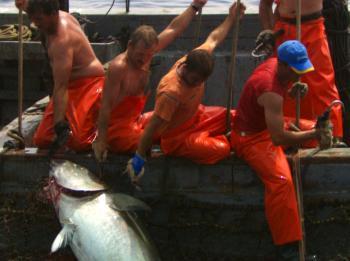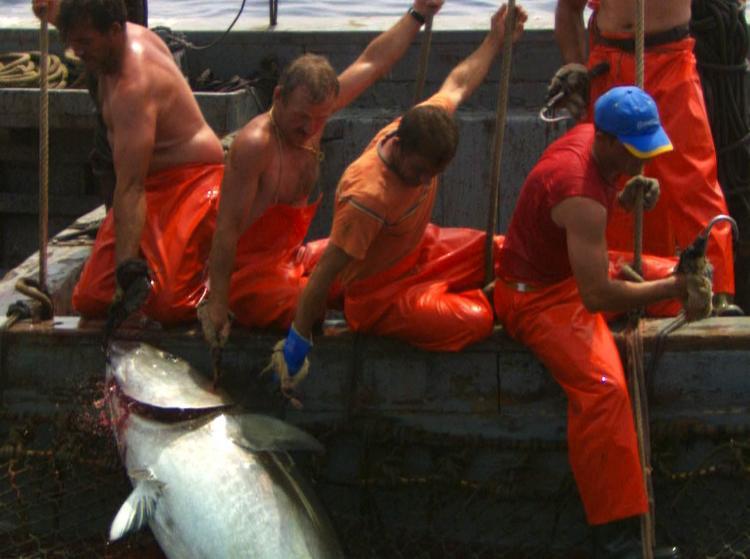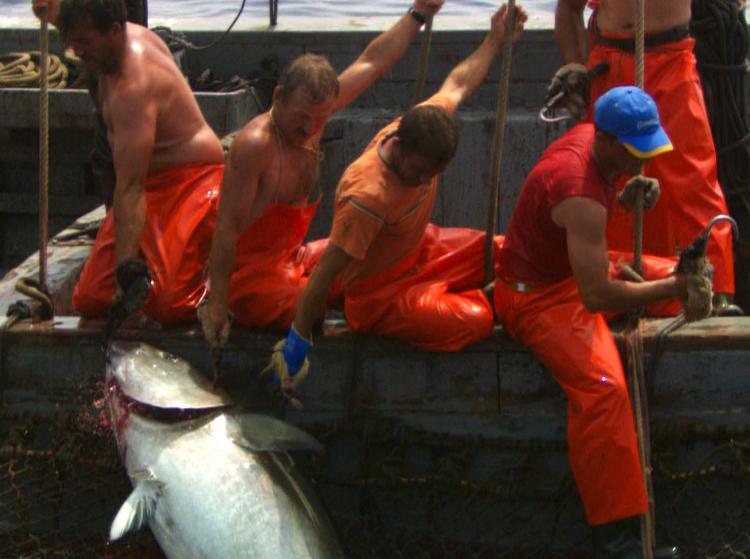The End of the Line is the world’s first major feature documentary about the devastating impact of over-fishing. Director Rupert Murray tells Epoch Times reporter Jaya Gibson about the making of the documentary, the stories they had to throw back in and why, and what kind of fish he eats.
ET: It took 2 years to make the film, what was the main obstacle you had to overcome?
Rupert Murray: I think editing was the major task. Trying to put something together that rigourously adhered to the accurate scientific data and reflected the debate and dispute over the findings and to make that appeal to someone who didn’t even know that there was a problem with the world’s oceans.
I think that the hard task was to decide what not to put it in because there were so many fascinating stories and characters. The more detailed it got, the more interesting I found the issue.
ET: Can you give us an example of a story that you had to leave out?
RM: Well, I was covering a meeting in Luxembourg about setting the fishing quotas for bluefin tuna and we were the only journalists there. They were discussing the European eel on the same agenda; the eel has declined by 99% since 1980 and even we weren’t doing that story. I though there it is, that’s the enormity of this issue.
We took the bluefin tuna as a poster boy for over-fishing but there are hundreds of other species slipping under the radar, even our radar. What about the deep-sea fish?
They are fishing into the deep sea and scooping up these fish that are hundreds of years old, no-one knows anything about their biology, their life-cycle, nothing, and they are just being cleaned out before people have even discovered.
They have to put biologists on the boats to identify them – oh look there’s another new one – and effectively they are destroying new species as they find them. It’s just an awful state of affairs.
ET: You only single out a few people and companies responsible but it seems that there are so many involved. Why single out the ones you did?
RM: To be honest, it was a question of not being able to squeeze it all in. The Chinese Communist Party was obviously the biggest culprit overall but anyone who is involved in bluefin tuna is responsible.
I would say that any company that’s involved in the capture, ranching, trading or selling bluefin tuna or any fish species that is classed as endangered is to blame.
In fact anyone who is eating these fish is to blame. Take shark fin soup for example. It’s an issue that gets some conservationists in the West really upset. It’s sought after by the Chinese purely as a tasteless thickener for the soup. The shark as an actual ingredient is more of a status symbol—only the fin is used and the rest thrown away.
Sharks are an incredible animal to swim with and you don’t need to interact with them to know their value. They have been around on the planet longer than trees which is a mind-blowing fact and to see them being destroyed at such a rate is quite incredible. In fact some species have declined 99.99%.
Actually, it’s not just a Chinese issue because there are European, American and Costa Rican fisherman who are catching the sharks, finning them and selling them to restaurants in London’s Chinatown. They probably go via Hong Kong and back to London.
When you remove the predators you get a knock on effect called ‘atrophic cascading’ whereby the once stable population of prey booms and wipes out their prey.
So in the sharks instance their prey are stingrays which boomed and in turn decimated the oyster population which is some cases such as Chesapeake bay were already to 1% of their original population. This over-fishing combined with pollution creates an anoxic zone where nothing can live due to the lack of oxygen. There are a lot of these zones in China, in fact they have the largest in the world and they are expanding, it’s really scary stuff.
ET: In the film its reported that the Chinese Communist Party constantly over-reported the catch in China seas year after year. How significant was this?
RM: It simply meant that the true figure of the global fish catch data was masked for 15 years. The discovery of these global over-fishing figures are 20-30 years behind climate science and this is one of the main reasons. So the problem was masked for 15 years which is a terrible set-back.
1988 was the year that it was estimated that the global catch had peaked ‘peak fish’ and it has been gradually declining ever since. But this was was only discovered in 2001 and the Chinese Communist Party has disputed the figures but all that time we could have been doing something about it.
Conservationists had been saying for a long time that locally everywhere all reported figures for fish catches were going down and that the global figure had to be wrong. So this when this research came out it was a vindication for the conservationists. The proof of China’s damaging practices is that the UNFAO [United Nations Food and Agriculture Organisation] produces 2 sets of figures now; one with the CCP’s figures and one without. That’s their way of being careful and saying we don’t trust the regime’s reporting.
This is an issue that has ’slipped though the net' of mainstream media and journalism. It doesn’t fit into any particular TV genre but it’s a story that desperately needs to be told. Within fisheries there’s less of a debate and hardly any in the environmental industry.
I think the way science needs to engage with us is very important. The way that the scientists had presided over this data was very closed off, they seemed to think that it wasn’t the public’s issue and it was too complex an issue for us to understand.
They have presided over these massive declines in fishing stocks. That’s why the work that scientists like Boris Worm and Daniel Pauley did is so important, they made their science accessible, engaged the public and the issue. It’s that closed shop mentality that they broke through. What they did was popularise the issue and said this matters to everyone, this is not just the fisheries industries issue, it’s not just for them to decide it is for everyone to decide because the oceans belong to everyone. The U.N. declaration of the sea’s opening line is “The ocean is the common heritage of all mankind” so we all own part of it, it’s everyone’s business.
ET: Mitsubishi is reported to control 40% of the global blue fin tuna market. Bluefin tuna frozen at -60C can be sold in a few years time and they can effectively hold the world to ransom by setting the price as high they like. Mitsubishi have said that it only freezes bluefin to ‘even out peaks and troughs in supply’.
RM: “What does phrase that ‘evening-out supply’ actually mean - it sounds like it has a very benign ring to it, but actually what does that mean for these magnificent wild predators out in the Mediterranean? From what I saw it means wholesale slaughter using a huge mechanised armada armed to the teeth with technology, using spotter-planes and helicopters targeting these wild populations of these fish that are on their last legs.
According to Roberto Mielgo, Mitsubishi play a huge part in what is a very badly regulated industry, a lot of people say a highly illegal industry. It’s outrageous really. It’s estimated that half of the fish caught is illegally caught that’s somewhere in the region of 30,000 tonnes a year.
In Dubrovnik 2007 there was a meeting to set the fishing quotas and one of the NGO’s arrived to find a white lily placed on their table which is a Southern European emblem for a funeral and people took this to be a mafia threat and its well known that there are organised crime elements within some of these fisheries and what are Mitsubishi doing having anything to do with it at all?
ET: Japan is a fish-loving nation and it’s a huge market, it would seem only logical to them that they take advantage of it.
RM: Yes of course, but what kind of business model is that? It’s not sustainable. Perhaps they are making so much money that they can afford to have the population of bluefin tuna to fail in 2 years time and it won’t matter to them.
ET: What do you think would happen to the ships?
RM: Well they will probably be modified to go after big-eye tune and yellowfin.
ET: What is sustainable fishing and what can do the average person do to make good decisions for themselves?
RM: I personally don’t eat large predators, I don’t eat large fish. I go for the smaller fish that are much more plentiful that are often used to feed farmed fish. So I eat things like mackerel, herring, anchovies and sardines. These contain all of the goodness you need such as omega 3 and oils you need and they are much more tasty than the bland white fish.
I eat farmed oysters as they are not fed fishmeal like wild caught fish and they do a good job filtering the water in estuaries.
What people really need to do is ask questions of their fish suppliers, whether it be a supermarkets or restaurant. Where did this fish come from? How was it caught? Is it endangered?
There are eco-labels for food packaging that are growing such as the Marine Stewardship Council, so if you look for a blue logo with a fish shaped like a tick, look for that and that will guarantee that it is sustainable. There are guides available from supermarkets that have a traffic-light system to show which fish are better to eat, they also tell you what they taste like. You can download the guide from our website http://endoftheline.com/
Quick Fish Facts
Illegal fishing is worth up to $9 billion a year
http://www.panda.org/
90% of the oceans’ large fish have been fished out
http://www.panda.org/
1% of the world’s industrial fishing fleets account for 50% of the world’s catches
http://www.cnn.com
Global fishing fleets are 250% larger than oceans can sustain
http://www.panda.org/
Only 0.6% of the world’s oceans are designated as protected
http://www.panda.org/
1 billion people rely on fish as an important source of protein
http://www.panda.org/
In 2004, 13,000 new marine species were discovered
http://www.coml.org






